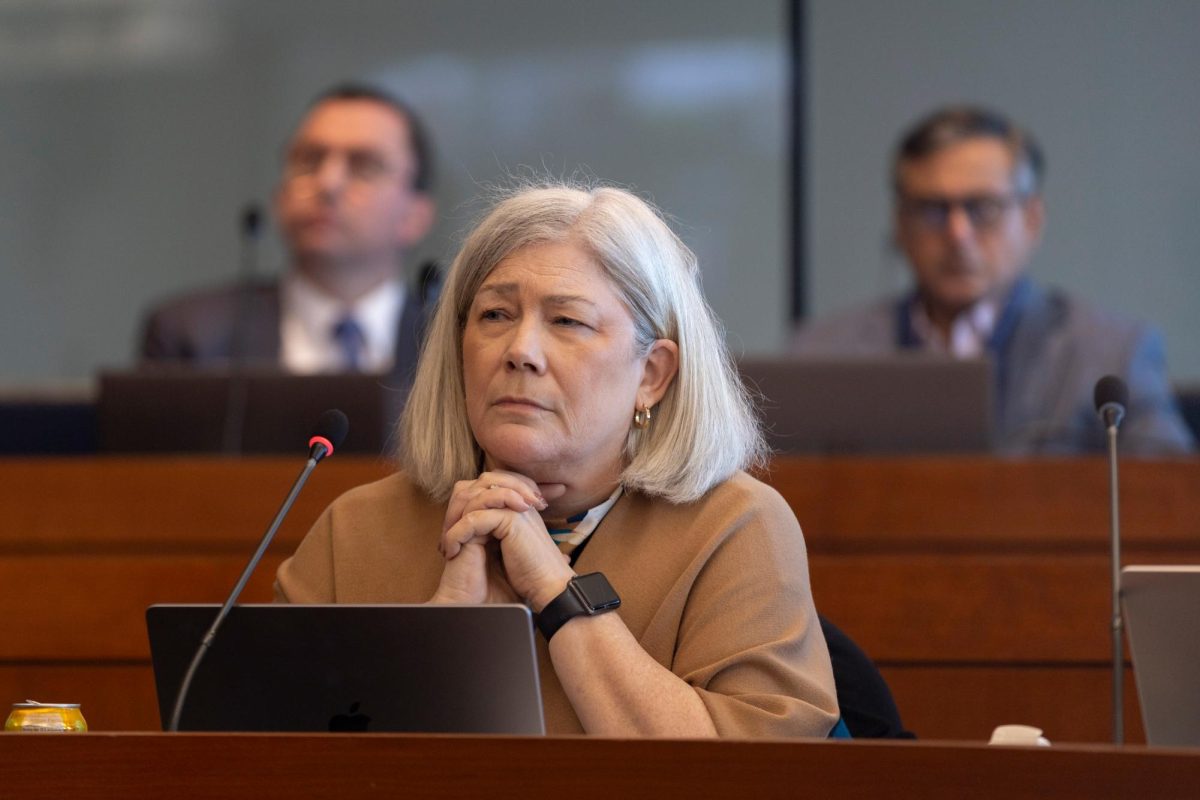University President Ellen Granberg said at a Faculty Senate meeting on Friday that GW once renegotiated the Medical Faculty Associates’ contract with its revenue cycle management contractor following concerns about its operations.
Granberg said GW CFO Bruno Fernandes renegotiated the MFA’s contract with Savista sometime since she began at the University in July 2023, and in the process addressed things that “needed to be fixed.” The response was prompted by faculty senator Guillermo Orti’s comment that MFA department chairs had reported during the senate’s most recent Professional Ethics & Academic Freedom Committee meeting that Savista’s billing processes are “less effective” than when the MFA managed them internally before Savista’s hiring in December 2019.
Savista is responsible for managing revenue cycle functions for the MFA, a network of health care providers and faculty affiliated with GW’s medical school and GW Hospital. Savista’s roles include coding for insurance claims, billing, explaining patients’ payment options and collecting the organization’s unpaid balances. MFA Board of Trustees Chair Ellen Zane sits on Savista’s board of directors.
Officials have said the MFA entered a relationship with Savista after the MFA Board’s Finance, Audit, Risk and Compliance Committee unanimously voted in November 2019 to choose Savista instead of three other options for the contract. Savista’s contract with the MFA officially began in July 2020, per a press release.
Officials have said on numerous occasions that Zane recused herself from the MFA board’s deliberation and vote on whether to retain Savista and affirmed that the MFA followed its policy for managing conflicts of interests with board members when managing Zane’s dual relationships.
“I can’t speak to the past, I don’t know how well it did,” Granberg said. “But I do know that when the time came to renegotiate, Bruno did think that there were things that needed to be fixed, and went about getting them fixed.”
Granberg also said she has “no idea” how Savista’s performance compares to the MFA’s former internal management processes, in response to a question from Orti, a professor of biology, about whether Savista has done a better job managing the MFA’s revenue cycle than the MFA did when it managed its own operations.
Granberg said MFA CEO Bill Elliott, who officials brought on last May, determined the MFA had not “appropriately” staffed itself to allow Savista to get the “maximum return” in terms of billing and coding. She said Elliott has since “fixed” this issue, but the lapse in staffing could be a reason behind MFA department chairs’ concern that Savista was not running efficiently.
Granberg said during her presidential report that GW and the MFA have “robust” conflict of interest policies that both organizations follow “faithfully.”
According to GW’s conflict of interest policy, trustees, officers, and key employees must disclose financial interests that could influence university decisions. The MFA follows similar guidelines, requiring leadership to recuse themselves from matters where personal or financial ties could present a conflict.
She said she’s seen a “fundamental disagreement” arise among community members and officials about how to best handle potential conflicts of interest given the community’s conversations about Zane’s business relationship with Savista that The Hatchet has covered.
She said “some people” believe an individual with a conflict of interest or the perception of one should not be allowed on the Board, which is “problematic” because it’s “relatively common” for trustees to have conflicts when they’re serving on an organization that requires extensive knowledge of the industry.
She said the pool of “qualified individuals” who could serve on a board would shrink if officials implemented such a requirement, aligning with Secretary to the University and Vice President for Board Relations Jonathan Post’s remarks to The Hatchet last week.
Granberg said she has worked personally with Zane since taking office in 2023 and observed her being “very serious” about her work on behalf of the MFA while following the requirements of her “conflict management plan.”
“No procedure is perfect, but I do think the requirement of disclosure and management is an effective way to balance having good controls with ensuring that you also have an ample supply of qualified people to serve,” Granberg said.
Sarah Wagner, a faculty senator and the co-chair of the senate’s Educational Policy and Technology Committee, asked Granberg whether she, Fernandes and Provost Chris Bracey had prepared and shared a report with GW Board of Trustees’ Academic Affairs Committee about the impacts and opportunity costs of the MFA’s ongoing losses on the University’s mission of advancing education across its schools.
The Faculty Senate voted last February to request that officials pen an annual report on the losses by March 1, 2024 and Feb. 1 of every following year. Wagner also asked Granberg if she would share the report with the senate’s EPT Committee if they had created one, as last year’s resolution requests.
The MFA has accrued more than $272 million in debt to GW and $120 million to other entities since 2018, per GW’s Fiscal Year 2024 consolidated financial statement. The organization lost more than $107 million in FY 2024, more than doubling officials’ projected deficit.
GW in 2018 restructured its relationship with the MFA and gained more governing power, including the authority to approve the MFA’s CEO, manage the annual budget, amend the organization’s bylaws and appoint members to the MFA’s Board. Faculty senators have for years raised concerns about the MFA’s financial status.

Granberg said as far as she knows there has not been a “specific report” prepared for the committees, but that the entire board is involved in conversations about the MFA’s losses. She said GW trustees are “concerned” about the impacts of the MFA’s financial condition, including its “impact on academics.”
“It’s not so much a report that goes to the Academic Affairs Committee, as it is that this is an important and robust element of the discussion with the board,” Granberg said.
Wagner said she is revisiting how the financial losses affect the University a year after the resolution, given that officials and community members are trying to create and finalize a strategic plan for the University’s future goals.
She said the MFA’s financial status has an effect on what plans the University can and cannot make, and officials won’t be able to know “how big” it can dream about its future without understanding the effects on academics.
“I ask it not because I want to be naive about what conversations do or do not happen in the Board of Trustees and vis-à-vis this particular committee,” Wagner said. “But rather, we are at a moment where it really feels monumentally important because we are about to engage in and endorse a strategic plan.”
Granberg said Wagner raised a “fair point” before moving onto additional questions.
Granberg separately said at Friday’s meeting she expects to send a “draft framework” of the strategic plan to GW Board of Trustees in May, which she expects it to approve in June. She said officials plan to launch the full framework in the fall.
Faculty senator Phil Wirtz, a professor of decision sciences and of psychological and brain sciences, asked Granberg why the MFA moved its conflict of interest compliance from GW’s Office of Ethics, Compliance and Risk to the MFA in March 2023 and the rationale behind the shift.
Granberg said in response that the shift was “necessary” to ensure that GW isn’t responsible for all of the enterprise’s liabilities.
“It is an independent organization with the authority to operate independently, and it needs to be, because we don’t want MFA liabilities to get all tied up with GW,” Granberg said.
Granberg invited GW General Counsel Charles Barber to further comment on the change, who said the MFA has always had its own conflict of interest Policy, given the MFA is a separate corporation.
MFA trustees are subject to the MFA Board’s conflict of interest policy. The MFA has a separate conflict of interest policy that governs physicians and staff who work at the enterprise.
Barber said there have “been times” when GW’s Office of Ethics, Compliance and Risk has assisted the MFA as it manages potential conflicts of interest, but the MFA in 2023 “ramped up” its own efforts to manage conflicts. He said the Office of the General Counsel works with the MFA’s Compliance Department to ensure it is meeting its own disclosure and recusal management policies.
“I don’t want to give the impression that GW is not involved at all,” Barber said. “There’s still some oversight and involvement of GW personnel.”





